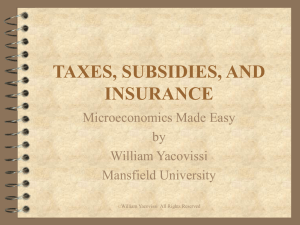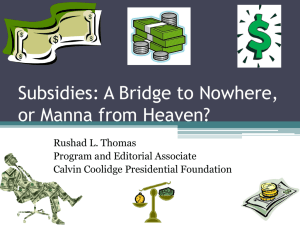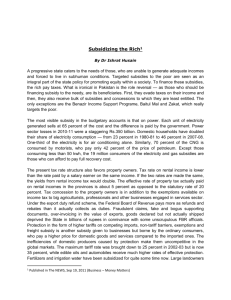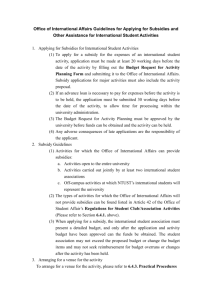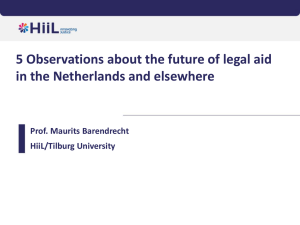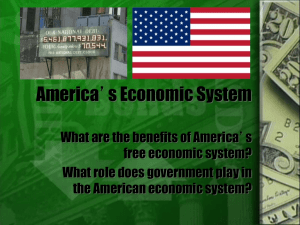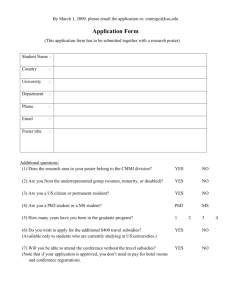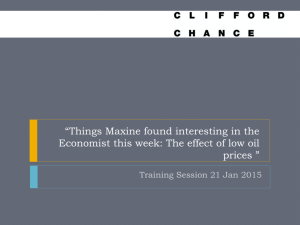Monday, 30 October 2006 Palais des Nations, Geneva
advertisement
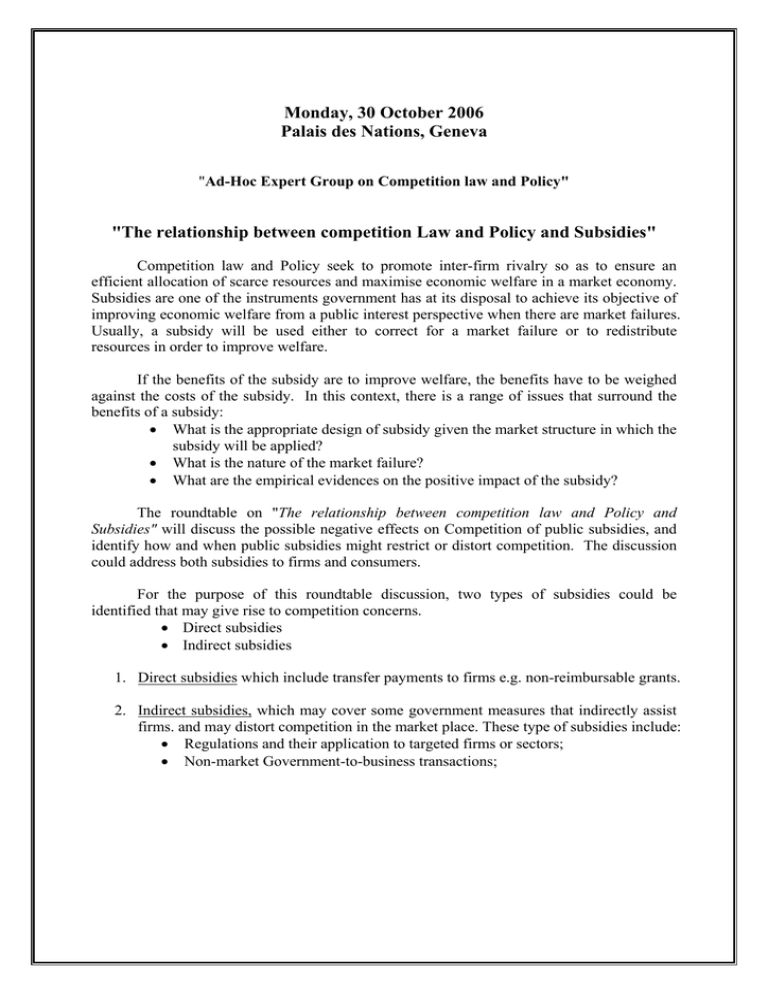
Monday, 30 October 2006 Palais des Nations, Geneva "Ad-Hoc Expert Group on Competition law and Policy" "The relationship between competition Law and Policy and Subsidies" Competition law and Policy seek to promote inter-firm rivalry so as to ensure an efficient allocation of scarce resources and maximise economic welfare in a market economy. Subsidies are one of the instruments government has at its disposal to achieve its objective of improving economic welfare from a public interest perspective when there are market failures. Usually, a subsidy will be used either to correct for a market failure or to redistribute resources in order to improve welfare. If the benefits of the subsidy are to improve welfare, the benefits have to be weighed against the costs of the subsidy. In this context, there is a range of issues that surround the benefits of a subsidy: • What is the appropriate design of subsidy given the market structure in which the subsidy will be applied? • What is the nature of the market failure? • What are the empirical evidences on the positive impact of the subsidy? The roundtable on "The relationship between competition law and Policy and Subsidies" will discuss the possible negative effects on Competition of public subsidies, and identify how and when public subsidies might restrict or distort competition. The discussion could address both subsidies to firms and consumers. For the purpose of this roundtable discussion, two types of subsidies could be identified that may give rise to competition concerns. • Direct subsidies • Indirect subsidies 1. Direct subsidies which include transfer payments to firms e.g. non-reimbursable grants. 2. Indirect subsidies, which may cover some government measures that indirectly assist firms. and may distort competition in the market place. These type of subsidies include: • Regulations and their application to targeted firms or sectors; • Non-market Government-to-business transactions; In order to facilitate the discussions during the roundtable, delegates might wish to consider the following issues: 1. How do subsidies affect firm behaviour? Entry and exit decisions? Pricing and output decision? R&D investment decision? 2. What type of subsidy is likely to give rise to competition concerns? 3. What are the costs of subsidies particularly in terms of development and poverty reduction? 4. What features of subsidy design and market structure could help lessen potential competition effects? 5. How do the characteristics of market structure, in which the subsidy is operating matter? ________________________________________________________________________ Given the time allocated to the discussion of this topic, the roundtable will not suffice for an in depth treatment of the relationship between subsidies and competition policy. One of the aims of this roundtable is to assess whether and with what emphasis the relationship between subsidies and competition policy can be pursued in more depth by the IGE Delegates are invited to submit notes and other relevant information on their national experiences in the design and the application of subsidies particularly as they relate to competition policy issues and development. In order to process and make written contributions available in advance of the meeting, delegates are kindly requested to submit their contributions as soon as possible but no later than 25 October 2006. Draft work programme 10:00 Opening statement by Dr. Supachai Panitchpakdi, Secretary-General of UNCTAD Introductory statement by Mr. Philippe Brusick Head Competition law and Consumer Protection Policies Branch 10:20 Keynote Speech: Prof. Carl Baudenbacher President EFTA - Surveillance Court, and St. Gallen University: "The relationship between Competition Law and Policy and Subsidies and their effects on development" 11:00 Panel discussion1: • Mr. Adolphe Coulibaly, Ministry of Trade, Burkina Faso; • Ms. Hilary Jennings, United Kingdom; • Mr. Amadou Dieng, Competition Division, WAMEU; • Mrs. Anna Jarosz-Frills, DG Competition, European Commission; • Mr. Jaime Barahona, Competition Tribunal, Chile • Ms. Odette Tsamba, Ministry of Industry and Trade, Mozambique; 12:00 General Discussion In order to allow maximum time for an interactive debate, Delegates are invited to submit written notes and other relevant information on their national experiences in the design and the application of subsidies particularly as they relate to competition policy issues and development. 13:15 Lunch Delegates wishing to speak during the session are invited to inform the Secretariat accordingly by contacting Ms. Mispa Ewene (mispa.ewene@unctad.org) or Mr. Pascal Garde (pascal.garde@unctad.org). 1 Prof. Matsushita from Japan is unable to attend the meeting. His paper is available in the conference room and UNCTAD website among other contribution.
